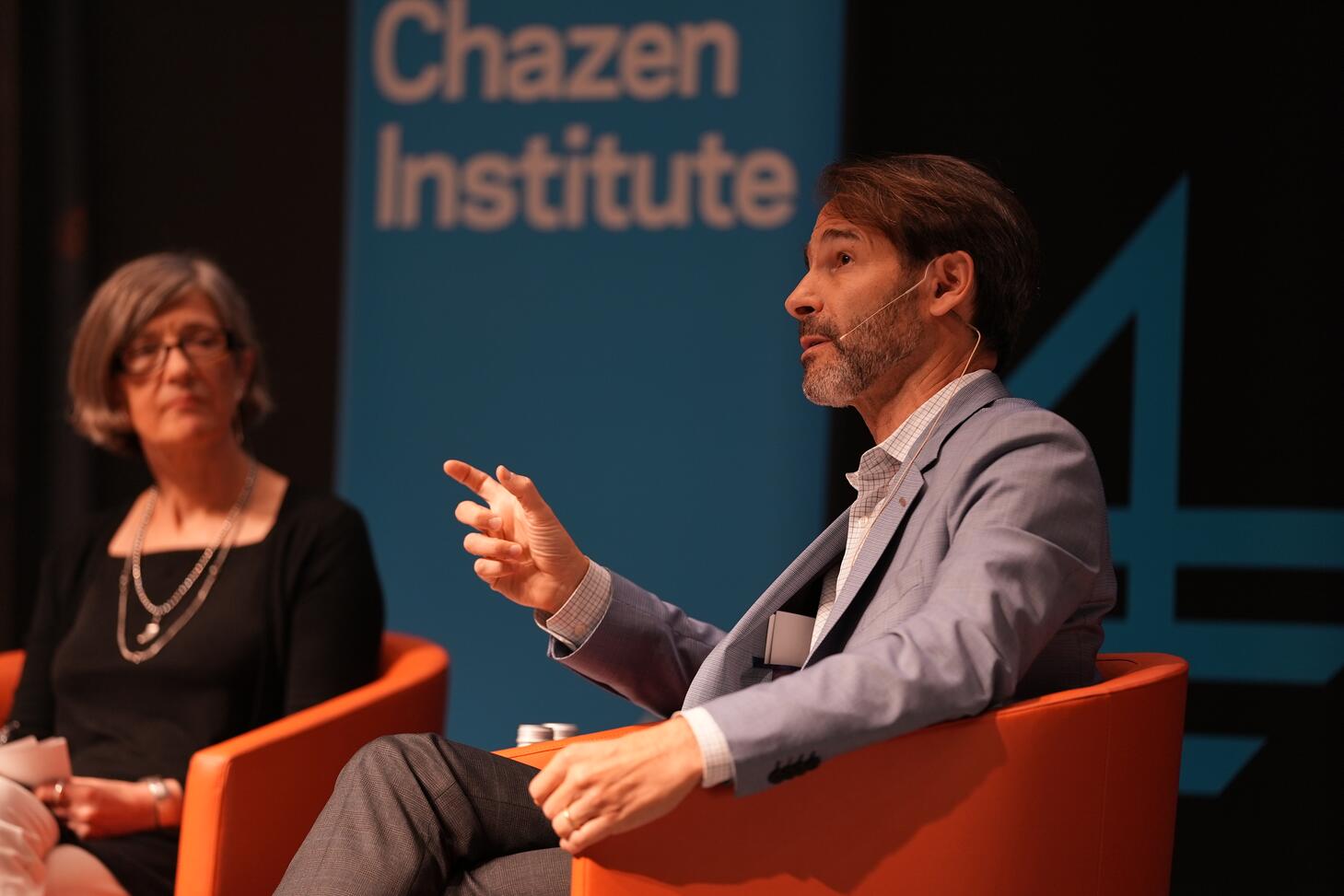UPDATE: This article was originally posted on March 15, 2019. It has been updated with new information and tips below.
With an enduring air of glamor and astronomical paychecks, getting a job on Wall Street is a goal for many MBA applicants.
Yet landing a high-paying finance job is no easy task, especially if you’re planning to switch careers to enter the field. Competition for jobs at top-tier financial institutions is cutthroat, so even small advantages can be the difference between earning a spot at a top firm and failing to break into finance.
One of the greatest advantages you can give yourself when it comes to breaking into finance is to attend an MBA program. Designed to help career-switchers and prestige-seekers alike land their dream jobs, an MBA is a powerful tool you can leverage to reach the next level of career success.
However, if you’re focused on working in the financial markets, not all MBA programs are created equal. Though all MBAs offer a general finance curriculum (such as accounting and corporate finance), certain programs have a much stronger track record when it comes to earning their graduates the most coveted jobs on Wall Street.
That’s why we’ve put together this list of the best MBAs for finance, as well as our best tips and tricks to ensure your dream of working in finance becomes a reality.
Why Attend an MBA to Break into Finance?
Though MBAs are designed to include courses on numerous business-related topics ranging from leadership to innovation, the fact is that certain programs are known for their strengths in certain areas.
For example, MIT Sloan’s long track record of excellence in operations consistently attracts many of our candidates who seek careers in this field. However, for those more interested in entrepreneurship, Stanford GSB, with its vast resources for entrepreneurial learning, might be the better option.
However, finance is one of the most common specializations our clients seek to pursue during their MBA as a gateway to a new career in the industry.
Some would argue that it’s better just to start applying for jobs on the Street and forgo business school altogether, but that could be a big mistake.
According to GMAC, 43% of enrolled MBA students use the program to switch careers, and 89% of graduates who wanted to switch careers state they were satisfied with their investment in the MBA to do so. In order to really stand out as a competitive candidate for a top-tier finance position, an MBA is necessary not only for your CV but to develop your skill set.
That’s because MBA programs offer you a combination of specialized curriculum, outstanding faculty, unparalleled alumni networks to help you make the connections that will open doors for your career, and, importantly, the support of a dedicated career services department whose key objective is landing you a job.
Though there are many programs that offer finance-focused specializations, the ten programs below are the best of the best.
The Top 10 MBAs for Finance
The University of Pennsylvania – Wharton School of Business
 Source: @whartonschool on Instagram
Source: @whartonschool on Instagram
Wharton remains the undisputed leader in finance education. With the largest finance faculty of any business school, Wharton offers unparalleled academic breadth and depth, including majors in Finance and Quantitative Finance. From corporate finance and investment banking to fintech and private equity, students can tailor their path with dozens of specialized electives.
The school also offers numerous hands-on opportunities, such as the Wharton Investment and Trading Group and the Wharton Private Equity & Venture Capital Club. Employers take notice—Wharton consistently sends a large share of its class to top finance roles at firms like Goldman Sachs, Morgan Stanley, and Blackstone. If you’re aiming for finance leadership, there’s no more comprehensive program than Wharton.
(To learn how to write outstanding Wharton essays, click here.)
The University of Chicago – Booth School of Business
 Photo courtesy of @chicagobooth on Instagram
Photo courtesy of @chicagobooth on Instagram
Booth’s reputation for finance is built on its legacy of Nobel Prize-winning research and its emphasis on economic fundamentals. The school offers a flexible curriculum that allows students to dive deep into topics like corporate finance, behavioral finance, derivatives, and portfolio management.
Booth’s curriculum is especially popular among analytically inclined students, with many leveraging the school’s strengths in quantitative modeling to break into investment banking, asset management, fintech, and beyond. The student-run Investment Management Group provides real-world exposure, and graduates are heavily recruited by top financial institutions and hedge funds. If you want to approach finance through a data-driven, rigorous lens, Booth is a standout.
(To learn how to write outstanding Booth essays, click here.)
New York University – Stern School of Business
 Source: @nyustern on Instagram
Source: @nyustern on Instagram
With its location in downtown Manhattan, NYU Stern offers unmatched proximity to the financial industry. The school has long been a magnet for investment banking, private equity, and corporate finance roles, and continues to evolve with emerging specialties like fintech, ESG investing, and risk management.
The finance department is one of the largest at Stern, with star professors like Aswath Damodaran (known for valuation expertise) anchoring a curriculum that spans technical and strategic finance topics. Stern also offers experiential opportunities like the NYU Impact Investing Fund, the Michael Price Student Investment Fund, and access to the Financial Gym and NYC FinTech events. For students who want to build a powerful finance career without leaving the city that never sleeps, Stern is a go-to destination.
(To learn how to write outstanding NYU Stern essays, click here.)
Columbia Business School
 Source: @columbia_biz on Instagram
Source: @columbia_biz on Instagram
Located just blocks from Wall Street, Columbia Business School offers front-row access to the financial capital of the world. Its curriculum features one of the most robust finance course offerings among top MBAs, including deep dives into asset pricing, capital markets, value investing, and real estate finance.
Columbia’s Value Investing Program, the Heilbrunn Center for Graham & Dodd Investing, and regular access to high-level finance practitioners make the school especially strong for those targeting buy-side careers. Through the Career Management Center, students can tap into a deep alumni network and frequent recruitment events from elite investment banks and hedge funds. If you’re set on finance and want to live and learn in New York, Columbia is a top-tier choice.
(To learn how to write outstanding CBS essays, click here.)
MIT – Sloan School of Management
 Photo courtesy of @mitsloan on Instagram
Photo courtesy of @mitsloan on Instagram
MIT Sloan takes a distinctive approach to finance, fusing the discipline’s analytical core with cutting-edge innovation in technology and data science. The school offers a finance certificate, and electives range from blockchain and financial engineering to advanced valuation and international capital markets.
Sloan’s tight-knit finance community is supported by student groups like the FinTech, Investment Banking, and Venture Capital & Private Equity Clubs. Employers value the strong quant training Sloan MBAs receive—many graduates go on to work at hedge funds, fintech startups, and quantitative trading firms. If you want to sit at the intersection of finance, innovation, and technology, MIT Sloan is a compelling choice.
(To learn how to write outstanding MIT Sloan essays, click here.)
Stanford Graduate School of Business
 Source: @stanfordgsb on Instagram
Source: @stanfordgsb on Instagram
Stanford GSB may be best known for entrepreneurship and innovation, but it also offers a powerful finance education, especially for those interested in venture capital, private equity, fintech, and the intersection of finance and technology. The curriculum includes both foundational and advanced courses like “Private Equity: From LBOs to Distressed Debt,” “Investing for Good,” and “Financial Modeling,” giving students the flexibility to specialize across a broad range of sectors.
Students looking for hands-on experience can join the Stanford GSB Impact Fund, where MBAs work in teams to source and conduct due diligence on early-stage investments with social impact. Stanford also has numerous finance-related clubs, including the Private Equity Club, which hosts speaker events, technical prep, and alumni panels.
With deep ties to Silicon Valley, access to elite VC and PE firms, and an alumni network that includes founders, funders, and financial leaders, Stanford GSB is ideal for MBAs looking to lead, innovate, and invest on a global scale.
(To learn how to write outstanding Stanford essays, click here.)
Harvard Business School
 Source: @harvardhbs on Instagram
Source: @harvardhbs on Instagram
Harvard offers a broad and influential finance education rooted in its hallmark case method. From day one, students dive into real-world financial dilemmas, discussing everything from leveraged buyouts and IPOs to corporate restructuring and sustainability investing.
Electives such as “Creating Value Through Corporate Restructuring” and “Private Equity Finance” draw students who want to lead in high-stakes financial environments. Outside the classroom, clubs like the Finance Club and Venture Capital & Private Equity Club provide both peer networking and access to top-tier firms. For students looking for a general management education with powerful finance outcomes, HBS delivers prestige, flexibility, and reach.
(To learn how to write an outstanding HBS essay, click here.)
Kellogg School of Management – Northwestern University
 Source: @mmmkellogg on Instagram
Source: @mmmkellogg on Instagram
Kellogg has become a rising star in finance over the last several years, moving beyond its traditional strengths in marketing and general management. Its Finance major now includes rigorous coursework in corporate finance, investment banking, risk management, and financial modeling, and it offers a specialized Finance Fellows full-tuition scholarship.
Kellogg’s Asset Management Practicum stands out as a top experiential learning opportunity, giving students hands-on experience managing a portion of the school’s endowment, applying real-world strategies in equity research and valuation. Students also benefit from the Kellogg Finance Network, an active alumni group offering mentorship and recruiting support across investment banking, hedge funds, and private equity. For students seeking a finance education that’s both analytically strong and leadership-focused, Kellogg is an excellent choice on the rise.
(To learn how to write outstanding Kellogg essays, click here.)
London Business School
 Source: @londonbschool on Instagram
Source: @londonbschool on Instagram
London Business School is a top choice for finance-focused MBA candidates looking for an international, hands-on education at the heart of one of the world’s most important financial hubs. With recruiters from firms like Barclays, Blackstone, HSBC, and McKinsey regularly visiting campus, LBS offers unparalleled access to global financial markets and institutions.
Academically, LBS delivers a flexible finance curriculum, with core and elective courses that span corporate finance, capital markets, asset management, private equity, and fintech. On the experiential side, the LondonCAP (London Core Application Practicum) allows students to work directly with leading companies—including investment banks and asset managers—on real-world strategic finance projects.
Outside the classroom, the numerous finance-focused clubs host treks to London-based firms, technical workshops, stock pitch competitions, and networking events with alumni in senior roles. Many students also participate in the Student Impact Investment Fund, gaining hands-on experience in portfolio management. For students seeking a gateway to European or global finance roles—whether in investment banking, hedge funds, or asset management—LBS offers rigorous training, world-class networking, and a prime location to launch an international career.
(To learn how to write outstanding LBS essays, click here.)
INSEAD
 Source: @insead on Instagram
Source: @insead on Instagram
INSEAD’s one-year MBA program is an intense, globally-oriented launchpad for finance professionals, particularly those looking to build careers across Europe, the Middle East, or Asia. With campuses in France, Singapore, and Abu Dhabi, INSEAD delivers a truly international perspective on capital markets, corporate finance, and cross-border investment.
The academic offering is robust: students take core courses in financial accounting, valuations, and capital markets before diving into electives on topics like Private Equity, Mergers & Acquisitions, Project Finance, Applied Corporate Finance, and Real Estate Finance.
Experiential learning is integral to the program. The Capstone course challenges students to apply their knowledge to real-world strategic issues, integrating concepts from finance, strategy, and leadership. Additionally, the INSEAD Private Equity & Venture Capital Club hosts annual conferences in Europe and Asia, providing forums for discussions on industry developments and networking opportunities with professionals and alumni.
For those seeking a fast-paced, internationally connected MBA with strong finance fundamentals and access to elite recruiters, INSEAD delivers both efficiency and global reach, making it one of the most internationally focused finance MBA programs available.
(To learn how to write outstanding INSEAD essays, click here.)
The Importance of Faculty and Curriculum in Finance MBAs
When considering which MBA is best positioned to help you launch your career in finance, it can be tempting to look only at employment information. However, how each school teaches finance, as well as the faculty they have at their disposal, varies greatly and may affect how effectively you can achieve your specific goals.
For example, recently, our client Frank was looking to transition from a role in corporate finance at a large multinational to a role in impact investment banking.
After discovering Columbia’s Value Investing program, whose curriculum is based on the Warren Buffett approach to allocating capital, he knew he’d found the perfect program for him. Though Chicago Booth, for example, also offers a stellar array of finance and investment professors, its curriculum’s focus on strategy and analytics just didn’t quite fit his interests as well.
 Source: Columbia Business School website
Source: Columbia Business School website
That’s why, before creating your shortlist of target schools, you’ll want to make sure to deep dive into each business school’s curricular specifics to ensure you’ll be able to pursue your specific academic interests at that program.
Shifting your Career to Finance
If you’re planning to use your MBA to break into finance, remember that simply attending a top-ranked school is not enough. You’ve got to work for it.
Though we suggest you capitalize upon all opportunities you encounter during your MBA, the following three are some of the most powerful.
Your Summer Internship is Essential
Though the most important decision you’ll have to make during your MBA process is where to attend, the second most important decision is, without a doubt, where you’ll do your summer internship.
A mainstay of 2-year MBA programs, summer internships not only give you the opportunity to test out whether or not a career in finance is really for you, but they also allow you to make essential connections that will greatly facilitate your ability to land an amazing post-MBA job.
In fact, summer internships are more important than ever, as a larger number of companies that traditionally recruited both first-year and second-year MBA students for full-time employment are now focusing more exclusively on recruiting first-year students.
This also means that more companies are offering internships (a recent GMAC survey indicated that 59% of companies have actively increased the number of MBA summer internships they offer).
As such, if you’re planning to land a job at a top-tier investment bank, you should make sure that, when planning your summer internship, you very carefully target the firms you’d like to receive offers from post-graduation.
Use your Network
One of the most important elements of the MBA is building your network with a global group of high-performing professionals.
Considering the alumni network you build during your MBA will put you in touch with potential employers and/or business partners, the strength of a school’s network will ultimately influence your career.
As such, we suggest you research extensively (via schools’ employment reports) where MBA graduates from your target programs end up working (to ensure you’ll have introductions to the firms you’re most interested in). Additionally, connect with current students and alumni to ask them how helpful a particular school’s network was in landing a job.
Location. Location. Location.
Though the world is increasingly global, where you do your MBA inherently still largely influences which opportunities you will have access to.
For example, let’s imagine you want to work on Wall Street and decide to go to Berkeley Haas. Though Berkeley Haas is a phenomenal MBA program, the headquarters of the firms most MBAs are dying to work for is a 6-hour flight away in New York City.
This doesn’t mean you can’t participate in New York-based recruiting and events, it just means you’re going to have to do a lot more planning ahead.
There’s no one “ideal” place to obtain your MBA, but location will ultimately play a role in your future. As such, it’s important to reflect fully on how this critical factor influences your MBA journey.
Get into a Top Finance MBA
During the MBA application process, you will need to make thousands of decisions that will impact your life for decades to come.
One of the most important decisions is where you choose to apply. If you’re interested specifically in top finance MBAs, you’ll have even tougher decisions to make.
Though you may be tempted just to work your way down the rankings, having a trusted ally who can use their deep knowledge of your profile and what different business schools offer can be the difference between loving your MBA program and wishing you’d done everything differently.
Many of our clients come to us with a general idea of what they want to do with their careers after they complete an MBA but lack specifics. Our career coaches step in at this point to help you define what you want out of your career, create concrete short-term and long-term goals to make sure your transition to finance is as successful as possible, and identify which business schools can best help you turn these dreams into reality.
We are especially proud to offer this service to you, as we find it helps our clients take greater advantage of their MBAs.
Apply to work with us and get accepted into your top-choice finance MBA!
Real MBA Essays That Got People In
School-specific sample essays that got our clients accepted






